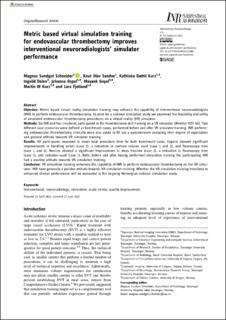Metric based virtual simulation training for endovascular thrombectomy improves interventional neuroradiologists’ simulator performance
Schneider, Magnus Sundgot; Sandve, Knut Olav Lende; Kurz, Kathinka Dæhli; Dalen, Ingvild; Ospel, Johanna; Goyal, Mayank; Kurz, Friedrich Martin Wilhelm; Fjetland, Lars
Journal article, Peer reviewed
Published version

Åpne
Permanent lenke
https://hdl.handle.net/11250/3011785Utgivelsesdato
2022Metadata
Vis full innførselSamlinger
- Department of Clinical Science [2318]
- Registrations from Cristin [9791]
Sammendrag
Objective
Metric based virtual reality simulation training may enhance the capability of interventional neuroradiologists (INR) to perform endovascular thrombectomy. As pilot for a national simulation study we examined the feasibility and utility of simulated endovascular thrombectomy procedures on a virtual reality (VR) simulator.
Methods
Six INR and four residents participated in the thrombectomy skill training on a VR simulator (Mentice VIST 5G). Two different case-scenarios were defined as benchmark-cases, performed before and after VR simulator training. INR performing endovascular thrombectomy clinically were also asked to fill out a questionnaire analyzing their degree of expectation and general attitude towards VR simulator training.
Results
All participants improved in mean total procedure time for both benchmark-cases. Experts showed significant improvements in handling errors (case 2), a reduction in contrast volume used (case 1 and 2), and fluoroscopy time (case 1 and 2). Novices showed a significant improvement in steps finished (case 2), a reduction in fluoroscopy time (case 1), and radiation used (case 1). Both, before and after having performed simulation training the participating INR had a positive attitude towards VR simulation training.
Conclusion
VR simulation training enhances the capability of INR to perform endovascular thrombectomy on the VR simulator. INR have generally a positive attitude towards VR simulation training. Whether the VR simulation training translates to enhanced clinical performance will be evaluated in the ongoing Norwegian national simulation study.
